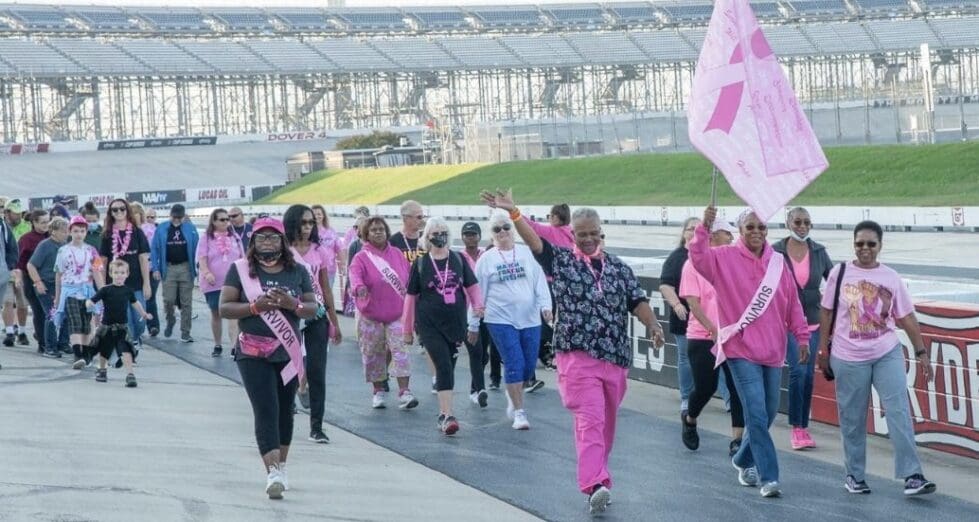

Events like the Monster Mile Walk for a Cause sponsored by DBCC provide social gatherings for those on a breast cancer journey
Early detection still the best way to fight breast cancer
October is Breast Cancer Awareness Month and despite the fact that there is far more information available on the disease than there was a decade ago, one in eight women will be diagnosed with breast cancer in their lifetime. And although men can also get breast cancer, their lifetime risk is considerably lower than women at 1 in 833.
“Breast cancer is the second most common cancer for women and its estimated as many as 1,010 women in Delaware will be diagnosed in 2022,” Connie Holdridge Sussex County Survivorship Director (DBCC), said. “In addition, 160 people in Delaware will die of breast cancer this year. However, 3.8 million breast cancer survivors are alive today due to early detection and advances in treatment.”
Holdridge explains that the best way to fight breast cancer is to know your body. If you see redness, scaling, or a rash or if you feel a lump in your breast, contact your doctor immediately. If the shape of your breast changes, you notice puckering or dimpling, notice discharge or a nipple becomes inverted, you should also visit a doctor. Some of the risk factors that may increase your risk of breast cancer include being born female, aging, drinking, hormone therapy in menopause, genetics, family history, obesity and the use of birth control.
“Although self-breast examinations are critical to diagnosing breast cancer early, mammograms are the most important weapon used in fighting breast cancer,” Holdridge said. “Women should get a mammogram annually from the age of 40 on or if they notice breast changes. Doctors may order mammograms at earlier ages if you have a family history of breast cancer. Other ways to help prevent breast cancer is to exercise regularly, make healthy choices, avoid or limit alcohol, maintain a healthy weight, breastfeed for at least six months and talk to your doctor about your personal risks.”
For those who received a diagnosis of breast cancer, DBCC can be a great resource to learn more about treatments, share experiences, and simply gather together socially. Terri Bohr, who was diagnosed seven years ago while living in. West Virginia, found DBCC when she moved to Delaware after she retired as a science teacher.
“I happened to stumble across from DBCC, I think on Facebook or I saw an ad,” Bohr said. “I called Lois (Wilkinson, Program Director of Education and Survivorship) and she put me in contact with all the activities and gatherings. Lois and Amanda (Perdue, Program Manager Young Survivors in Action and Yes2Health) are just phenomenal. The activities organize are so new and different.”
Bohr explained that a lot of the events held by DBCC allow those who have been diagnosed with breast cancer, to get together and share their stores. They talk about how long it has been since they were diagnosed, what type of cancer and what they are going through. She stated that there was little time to feel sorry for herself when she heard stories of women who were 30 year survivors or other women newly diagnosed who were frightened as well as those who have had recurrences.
“Where else can you get together and talk about breasts for several hours?” Bohr laughed. “I was also able to get feedback on doctors and facilities that are available here. The support is outstanding.”
Some of the programs that Bohr enjoys are the Nurture with Nature programs spend time outdoors, including kayaking at Killen’s Pond. Bohr stated that they have been picking blueberries or visit a winery where they can sit and talk in a social setting about their journey. They also have craft nights whether it is stained glass, wreath making or a book club. The events are filled with food, drinks and “lots of laughing.”
“As for those who have been newly diagnosed, I want to say one day at a time, but it’s more like one step at a time,” Bohr said. “If you are just starting radiation, just do the radiation step. Don’t worry about what’s going to happen five years down the line or what if it comes back. Also, ask lots of questions. Sometimes, when you are newly diagnosed, you’re in a state of numbness, although different people deal with it different ways. I got very technical. I had to know how that machine worked when I went for radiation. Like what is it, why does it move this way. That was how I dealt with it. Scientifically as a science teacher. But asking questions is very important.”
Bohr also advised anyone diagnosed with any illness to be gentle with themselves and that it was fine to have a day to just cry and feel sorry for yourself.
“I don’t understand even now why the word cancer hits like it does,” Bohr said. “Many people have other illnesses, people have diabetes or kidney disease, or heart disease and they all have dire possibilities somewhere down the road, but for some reason the word cancer strikes fear in the hearts of men, and I haven’t gotten my mind around that yet. I think the fact that I had cancer will always be there in the back of my mind. But I just have to think that if that’s part of God’s plan for me, He’s going to have to give me the strength to deal with it and I’ll do it just like I did the first time around.”
Bohr cannot say enough about the staff at DBCC and how they have helped her on her journey.
“These women who do this,” Bohr said. “I know it’s their job, but still, they are the kindest, most compassionate, caring ladies I. have ever met. I can call them at any time and say “I’m crying now. Can you just pat me on the head and say ‘there, there.” And they are there to do just that.”
When breast cancer is caught early, there are more treatment options available. If someone is running into obstacles blocking them from getting screened, such as lack of a primary care provider, insurance or even transportation, the team at DBCC can help. For the community looking to support DBCC, visit their website at debreastcancer.org to discover ways to get involved or support the fight against breast cancer in Delaware this October.


Share this Post



